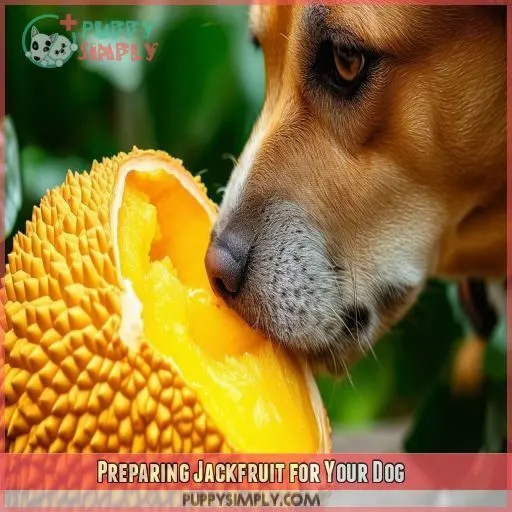This site is supported by our readers. We may earn a commission, at no cost to you, if you purchase through links.
 Apologies, the research provided did not include an answer.
Apologies, the research provided did not include an answer.
Table Of Contents
Key Takeaways
- Jackfruit is safe for dogs to eat and offers various nutritional benefits, including vitamins, minerals, and fiber.
- However, it should be given in moderation due to its high sugar content, and seeds and skin should be avoided as they can pose a choking hazard.
- Some dogs may experience digestive issues, vomiting, diarrhea, or allergic reactions, such as excessive itching, after consuming jackfruit, so it’s important to introduce it slowly and in small amounts.
- Always consult your veterinarian before introducing new foods to your dog’s diet, especially if they have any health conditions.
Jackfruit and Dogs: a Safe Treat?
So, can your furry friend join in on the jackfruit fun? Let’s find out if this tropical treat is safe for dogs to devour.
Is Jackfruit Toxic to Dogs?
The good news is, Jackfruit isn’t toxic to dogs. However, it’s not a natural part of their diet, so moderation is key. Here are some important things to keep in mind:
- Choking hazard: Avoid giving your dog jackfruit seeds as they can be a choking hazard and difficult to digest.
- Potential digestive issues: Some dogs may experience vomiting, diarrhea, abdominal pain, or lethargy after consuming jackfruit.
- Allergic reactions: Although rare, dogs can have an allergic reaction to jackfruit, so watch for excessive itching or a rash.
- Sugar and fiber content: Jackfruit is high in sugar and fiber, so too much can lead to weight gain, diabetes, and digestive upset.
While jackfruit isn’t toxic to dogs, it’s important to be cautious and introduce it to your dog’s diet in small amounts. Always consult your vet before adding new foods to your dog’s diet, especially if they’ve any health conditions.
Nutritional Profile of Jackfruit
Jackfruit is a tropical treat packed with vitamins, minerals, and fiber. It’s like a multivitamin wrapped in a tasty package. But is it good for your dog?
Here’s a quick overview of jackfruit’s nutritional highlights:
| Nutrient | Benefit |
|---|---|
| Fiber | Aids digestion and prevents constipation. |
| Vitamins A, C, and B-complex | Support immune health, healthy skin and coat, and energy metabolism. |
| Minerals | Potassium, calcium, and iron contribute to bone strength and overall health. |
While jackfruit offers a range of nutrients, it’s important to remember that it’s still a treat and should be offered in moderation due to its sugar content.
Benefits of Jackfruit for Dogs
Jackfruit is a good source of nutrition for dogs, offering a range of vitamins and minerals. Its texture is similar to meat, making it an enjoyable treat for dogs. However, it’s important to remember that jackfruit should only be given in small amounts as treats, and not as a staple food in their diet.
Potential Pitfalls of Feeding Jackfruit
While jackfruit is generally safe for dogs in small amounts, there are a few potential issues to watch out for. In this section, we’ll explore the pitfalls of feeding jackfruit to your dog, including digestive problems, allergies, and choking hazards.
Digestive Issues in Dogs
Jackfruit can cause tummy troubles for your furry friend, leading to digestive issues like vomiting, diarrhea, and abdominal pain. Here are some potential pitfalls to watch out for:
- Dog digestion and fiber: Jackfruit is high in fiber, which can be great for regulating digestion, but too much fiber too quickly can lead to digestive upset.
- Portion control: The high sugar and fiber content in jackfruit means that portion control is key. Treats should only make up 10% of your dog’s daily diet, and even smaller dogs need smaller amounts.
- Dog food intolerance: Some dogs may have sensitive stomachs and be more prone to digestive issues. It’s important to introduce new foods gradually and monitor your dog’s reaction.
Allergic Reactions to Jackfruit
While jackfruit allergies in dogs are rare, they can happen.
Keep an eye out for excessive itching or skin rashes. If your furry friend starts scratching like crazy or develops red, irritated skin, it might be an allergic reaction.
Discontinue feeding jackfruit and consult your vet if you notice any unusual symptoms.
It’s always better to be safe than sorry when it comes to your pet’s health.
Jackfruit as a Choking Hazard
While jackfruit is safe for dogs in moderation, its seeds pose a choking hazard. The seeds are also tough to digest, so it’s best to avoid them altogether. Stick to the fleshy part of the fruit and keep portions small. This way, your furry friend can enjoy a tasty treat without any risks.
Preparing Jackfruit for Your Dog
So, you’ve decided to give your furry friend a taste of jackfruit. Awesome! But before you do, there are a few things you need to know about preparing this tropical treat for your pup.
First things first, let’s talk about how to get rid of those pesky seeds and that tough rind.
Removing Seeds and Rind
When preparing jackfruit for your dog, it’s really important to remove both the seeds and the rind.
The seeds pose a serious choking hazard and can be hard for dogs to digest, so it’s best to avoid them altogether.
The tough rind can also be a challenge for dogs to chew and digest, so it’s important to cut it away and discard it before serving jackfruit to your furry friend.
Cooking and Serving Jackfruit
If your dog has never tried jackfruit before, start with a small piece to see how they react. You can offer it raw or cooked, but make sure to remove the skin and seeds first. Here are some tips to keep in mind:
- Introduce jackfruit slowly and in small amounts to avoid tummy troubles.
- Always watch your dog when they’re trying new foods to make sure they don’t choke or have any bad reactions.
- Keep treats to a minimum, especially if your dog is on the smaller side.
Portion Control for Small and Large Breeds
Size definitely matters when it comes to portion control. Smaller dogs might get an upset stomach from even a small amount of jackfruit, so start with a tiny taste and see how they do. For larger breeds, a slightly bigger serving is fine, but remember, it’s still a treat. You don’t want your pooch getting a sugar rush!
Recognizing and Managing Jackfruit Allergies
While jackfruit is generally safe for dogs, allergies can occur. In this section, we’ll teach you how to spot the signs of an allergic reaction in your dog and what to do if one arises.
Identifying Allergic Reactions in Dogs
While jackfruit allergies in dogs are rare, they can happen.
If your dog has never tried jackfruit before, it’s important to watch out for any signs of an allergic reaction.
Common symptoms of allergies in dogs include excessive itching, skin rashes, hives, swelling, and respiratory issues such as coughing or wheezing.
If you spot any of these symptoms after feeding your dog jackfruit, it’s best to stop giving them the fruit and talk to your vet.
Consultation With a Veterinarian
If you notice any signs of an allergic reaction in your dog, such as excessive itching or a rash, it’s important to consult your veterinarian. They can provide expert advice and guidance on managing your dog’s specific condition. Here are some key reasons why consulting a veterinarian is essential:
- Expert Diagnosis: Vets can accurately diagnose allergies and rule out other potential causes of your dog’s symptoms.
- Tailored Treatment Plans: They’ll create a treatment plan specific to your dog’s needs, making sure they’re comfortable and safe.
- Allergy Management: Vets can advise on how to manage your dog’s allergies, including dietary adjustments and environmental modifications.
- Emergency Preparedness: In the event of a severe allergic reaction (anaphylaxis), vets can provide urgent care and guidance on how to respond in the future.
- Peace of Mind: Consulting a vet will give you peace of mind and make sure your dog receives the best possible care.
Alternatives to Jackfruit for Dogs
If you’re looking for other fruits and veggies to offer your pup, there are plenty of options. From apples and bananas to carrots and peas, your dog can enjoy a rainbow of flavors and nutrients.
Safe Fruits and Vegetables for Dogs
If you’re looking for some tasty and nutritious alternatives to jackfruit, there are plenty of fruits and veggies that fit the bill.
Apples, bananas, cucumbers, and mangoes are all safe bets that your dog will love.
For veggies, go for broccoli, carrots, or peas.
These options are safe and packed with vitamins and minerals that can benefit your furry friend.
Just remember to always consult with your vet first, especially if your dog has any health conditions, and introduce new foods gradually to avoid any tummy troubles.
Fruits to Avoid Feeding Your Dog
While jackfruit is generally safe for dogs in moderation, there are other fruits that are a no-go for your furry friend.
Grapes are a big no-no, as they can cause kidney failure in dogs. avocados are also a bad idea since they contain persin, a toxin that can lead to vomiting and diarrhea. Cherries are another fruit to avoid due to their pits, which contain cyanide and can cause breathing difficulties.
Vegetables to Avoid Feeding Your Dog
While there are some great veggie options for your dog, there are a few to steer clear of.
Onions, mushrooms, and asparagus are a no-go. These veggies contain toxins that are harmful to dogs. Avocados are also a bad idea due to persin, a toxin that can cause vomiting and diarrhea in dogs.
Before Adding Jackfruit to Your Dog’s Diet
Before you add jackfruit to your dog’s diet, there are a few things to keep in mind.
First, consult your vet, especially if your dog has any health issues.
Always remove the skin and seeds before serving jackfruit to your dog, as these can pose a choking hazard.
Start with a small piece to see how your dog reacts, and remember that treats should only make up about 10% of their daily intake.
Monitoring Your Dog’s Reaction
When introducing jackfruit, keep a close eye on your dog’s behavior and watch for any changes. You know your dog best, so trust your instincts. If something seems off, stop feeding jackfruit and consult your vet.
Monitor your dog’s treat absorption and bioavailability. While jackfruit is safe in moderation, every dog is unique, and their metabolism and reaction times may vary. Always proceed with caution and seek professional advice if you’re unsure.
Personalized Advice for Your Dog’s Needs
Every dog is unique, and their dietary needs can vary based on breed, size, age, and health conditions. If you’re unsure about whether jackfruit is suitable for your dog, it’s best to consult a veterinarian. They can provide advice specific to your dog’s needs.
There are plenty of other fruits and vegetables that dogs can enjoy, like apples, bananas, and carrots.
Frequently Asked Questions (FAQs)
Is jackfruit toxic to dogs?
Jackfruit isn’t toxic to dogs, but it can cause digestive issues. It’s safe in moderation, but watch for allergies and tummy troubles. Avoid seeds and skin—they’re choking hazards. Always consult your vet first.
Can dogs and cats eat jackfruit?
Jackfruit is toxic to cats, but safe for dogs in moderation. Avoid giving your dog the seeds, skin, and latex surrounding the fruit’s flesh.
Who should not eat jackfruit?
You shouldn’t feed jackfruit to your dog if they’ve health issues, are small, or are prone to allergies. Jackfruit is safe for humans, but it’s a no-go for dogs unless you get the all-clear from your vet.
Are there any fruits dogs can’t eat?
Dogs shouldn’t eat avocados, grapes, raisins, cherries, lemons, limes, grapefruit, or plums. These fruits can cause vomiting, diarrhoea, intestinal issues, or even kidney failure.
How do I know if my dog is allergic?
You’ll know your pup’s allergic if they start itching like crazy or break out in hives. Always watch for signs of distress after introducing new foods. When in doubt, ask your vet.
What if my dog eats the seeds?
Don’t panic. Jackfruit seeds are tough to digest and can be a choking hazard, but they’re not toxic. If your dog ate a few seeds, keep an eye out for any unusual behaviour or discomfort.
How much jackfruit is too much?
Jackfruit isn’t a natural part of a dog’s diet, so only feed your dog a small amount. Treats should only make up 10% of their daily intake. Always watch for any signs of discomfort or allergic reactions.
What happens if my dog eats the skin?
If your dog eats jackfruit skin, it could cause a blockage in their guts, leading to abdominal pain and vomiting. The rough texture of the skin can also irritate their mouth and stomach. It’s best to call your vet for advice.
What other fruits are safe for dogs?
Apples, bananas, pears, pineapple, cranberries, honeydew, watermelon, and strawberries are all fruits that are safe for dogs to eat, but remember to always serve them in moderation and remove any seeds, rinds, or peels first.
Conclusion
So, can dogs eat jackfruit? Absolutely! Jackfruit is a safe, tasty treat for your furry friend when prepared and served in moderation. As with any new food, always monitor your dog’s reaction and consult your vet if you have concerns. Now you can confidently share this tropical delight with your pup, knowing it’s a healthy option that won’t cause harm.











